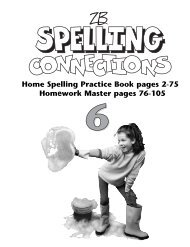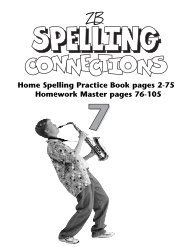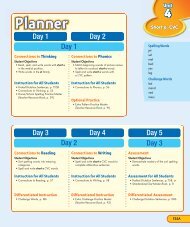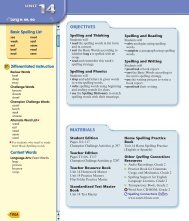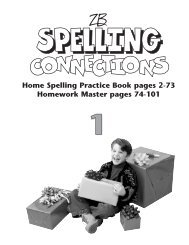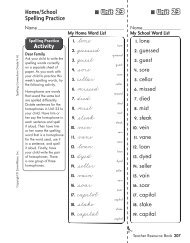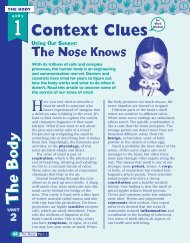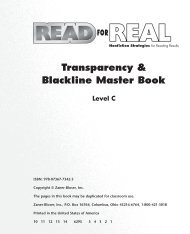Level D - Zaner-Bloser
Level D - Zaner-Bloser
Level D - Zaner-Bloser
You also want an ePaper? Increase the reach of your titles
YUMPU automatically turns print PDFs into web optimized ePapers that Google loves.
Dear Family,<br />
School to Home<br />
Good reading comprehension is of vital importance to your son or daughter. Nonfiction<br />
textbooks in science, social studies, and math can be especially challenging. In addition,<br />
standardized tests demand that students read and understand quickly. Outside of the<br />
classroom, the challenge continues as students read magazines, newspapers, instructions,<br />
and other types of nonfiction material.<br />
Your child is currently using Read for Real: Nonfiction Strategies for Reading Results.<br />
This program teaches valuable reading comprehension strategies to help students become<br />
better nonfiction readers. Here is a list of the strategies and how they work:<br />
When to Use the Strategy What the Strategy Says What the Strategy Means<br />
Please discuss the strategies with your son or daughter while he/she is doing homework.<br />
You might even use some of the strategies as you and your child discuss television<br />
shows, movies, and newspaper or magazine articles.<br />
Thanks for your help!<br />
Sincerely,<br />
Before Reading<br />
During Reading<br />
After Reading<br />
Preview the Selection<br />
before you begin to read.<br />
Activate Prior Knowledge<br />
about the topic.<br />
Look at the pictures, headings, etc., to<br />
get an idea of what it will be about.<br />
Think about what you already<br />
know about the topic.<br />
Set a Purpose for reading. Decide what you want to learn as<br />
you read.<br />
Make Connections with<br />
what you are reading.<br />
Interact With the Text<br />
as you read.<br />
Clarify Understanding<br />
of what you are reading.<br />
Think about how your life and knowledge<br />
fit in with what you are reading.<br />
Ask and answer questions about<br />
what you’re reading.<br />
If something doesn’t make sense,<br />
look for clues to help it make sense.<br />
Recall what you just read. Try to remember key facts<br />
or ideas.<br />
Evaluate the selection. Decide whether the selection was<br />
based on facts.<br />
Respond to what you read. Form your own opinion about<br />
what you’ve read.




